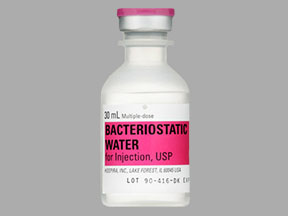
Bacteriostatic Water(benz Alc) Coupons & Savings Card – Discount Prices from $1.01
Bacteriostatic water is a sterile solution used to dilute or dissolve medications for injection. It contains 0.9% benzyl alcohol, which acts as a preservative to inhibit bacterial growth, allowing the solution to be used multiple times over a period of up to 28 days. However, due to the potential toxicity of benzyl alcohol, bacteriostatic water should not be used in neonates, and caution is advised when administering it to pregnant women. Additionally, it is important to ensure that the medication being diluted is compatible with bacteriostatic water, as some drugs may interact adversely with benzyl alcohol.
Our coupons are free to use. Before paying, show the pharmacist your Bacteriostatic Water(benz Alc) savings card to get your free discount. Use our filters below to edit the prescription box to match your needs. The Bacteriostatic Water(benz Alc) prices will update based on your prescription needs. Above our Bacteriostatic Water(benz Alc) coupons, you can change your location to see pharmacy prices and costs in other areas. We're here to help you buy Bacteriostatic Water(benz Alc) at the lowest price with our prescription discount card.
My prescription
Edit
10ML, Bacteriostatic Water(benz Alc) (1 Vial)
Select pharmacy

CVS
$19.05
COUPON PRICE
Walmart
$1.01
COUPON PRICE
Walgreens
$2.00
COUPON PRICE
Albertsons
$2.18
COUPON PRICEBacteriostatic Water(benz Alc) savings card
Show this card to your pharmacist
Walmart
$1.01
BIN
ID
PCN
GRP
019876
LH9A358510
CHIPPO
LHX
Powered by
Bacteriostatic water is a sterile solution used to dilute or dissolve medications for injection. It contains 0.9% benzyl alcohol, which acts as a preservative to inhibit bacterial growth, allowing the solution to be used multiple times over a period of up to 28 days. However, due to the potential toxicity of benzyl alcohol, bacteriostatic water should not be used in neonates, and caution is advised when administering it to pregnant women. Additionally, it is important to ensure that the medication being diluted is compatible with bacteriostatic water, as some drugs may interact adversely with benzyl alcohol.
Our coupons are free to use. Before paying, show the pharmacist your Bacteriostatic Water(benz Alc) savings card to get your free discount. Use our filters below to edit the prescription box to match your needs. The Bacteriostatic Water(benz Alc) prices will update based on your prescription needs. Above our Bacteriostatic Water(benz Alc) coupons, you can change your location to see pharmacy prices and costs in other areas. We're here to help you buy Bacteriostatic Water(benz Alc) at the lowest price with our prescription discount card.
Bacteriostatic Water(benz Alc) dosage forms
Use our Bacteriostatic Water(benz Alc) 10ML coupon with prices from $1.01 for 1 Vial. You can also use our Bacteriostatic Water(benz Alc) 10ML coupon with prices from $1.01 for 2 Vials. We have a Bacteriostatic Water(benz Alc) 10ML coupon with prices from $1.01 for 3 Vials.
Dosage Quantity Price from Per unit 10ML 1 Vial $1.01 $1.01 10ML 2 Vials $1.01 $0.51 10ML 3 Vials $1.01 $0.34
| Dosage | Quantity | Price from | Per unit |
|---|---|---|---|
| 10ML | 1 Vial | $1.01 | $1.01 |
| 10ML | 2 Vials | $1.01 | $0.51 |
| 10ML | 3 Vials | $1.01 | $0.34 |
